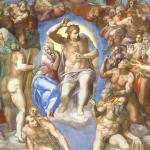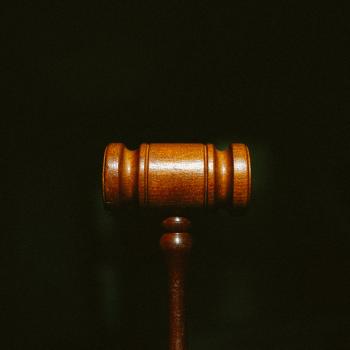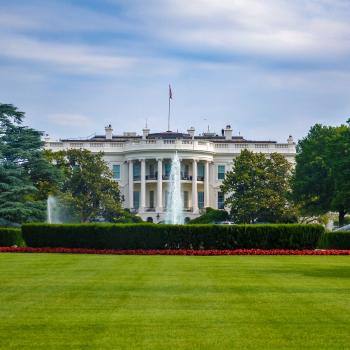
Since election day(s) technically isn’t over, I’m going to keep posting these New England (17th to 18th century) sermon notes (and maybe thereafter as well given the positive response to them). New and timely one below. Enjoy!
Noah Hobart (1706-1773) was born in Hingham, Massachusetts in 1706, graduated from Harvard in 1724, and was ordained pastor of the First Congregational Church at Fairfield, Connecticut in 1733. He gained some renowned for entering a pamphlet skirmish with Anglicans in the era, and for defending the validity of Presbyterian ordination. Timothy Dwight said of Hobart: “He possessed high intellectual and moral distinction. He had a mind of great acuteness and discernment; was a laborious student; was extensively learned, especially in history and theology; adorned the doctrine which he professed by an exemplary life, and was holden in high veneration for his wisdom and virtue.” Would that this could be said of all of us after we have passed.”
The title Hobart gave to his election day discourse of 1750 was, “Civil government the foundation of social happiness.”
The occasion was the election of a new governor, Roger Wolcott (1679-1767). The previous governor, Jonathan Law (1674-1750), had died in office (as all governors of Connecticut Colony did, until Wolcott). The new governor was born poor in a frontier village and proceeded through adolescence with limited education, initially training as a weaver. But by 1709 he was admitted to the bar and, apparently, had garnered some public reputation as a militia officer. He led part of the company on the boondoggle into Quebec during Queen Anne’s War which, per the account of John Wise to Increase Mather, was poorly and timidly managed (the New Englanders had been a little to eager to prove themselves to the home government). Wolcott latter served as speaker of the lower house and then in the upper. By 1741 he was deputy governor which traditionally implied a joint appointment as chief justice of the superior court. Wolcott held that position until he succeeded Law in 1750. Wolcott’s was a true rags to riches story. Unfortunately, as alluded to earlier, his tenure was rocky and he left office prematurely, resigning from public life and to private study–there’s a lesson there for today’s politicians too. (Wolcott’s son, Oliver, would become a signer of the Declaration of Independence and governor of Connecticut.)
***
Hobart, like many before him, begins his sermon by rooting civil government in the inherent sociability of man:
“It is evidently agreeable to the will of God, the Sovereign Ruler of the World, that men whom He has made sociable Creatures, should live in Communities, and enjoy the Benefits and Advantages that are peculiar to the Social Life. This cannot possibly be effected without erecting & supporting Civil Government.”
Government, as an ordinance of God, certainly responds to and restrains lapsarian man’s sin; it prevents anarchy and allows men to enjoy the “proper Advantages of Society,” that is, life together. Society is favorable to solitude but only if it is orderly and safe. Government—a coercive force that preserves orders, the minimal conditions of life together—is necessary to have peaceful society, but society itself, the polis, is a natural outgrowth of man’s nature. But government is not merely charged with keeping inhabitants from killing each other. It also restrains “irregular Appetites” and induces men to consider what is right and wrong. That is, government’s coercive force and laws perform a pedagogical function (and must, therefore, reflect the law of God), as well as a police function (indeed, the two go hand-in-hand).
Now, Hobart says something that will interest some readers—but that was not uncommon for his day, nor within the Reformed tradition—regarding governmental form or polity. What Hobart says is significant for whilst I cannot find evidence of writings from Hobart on church government, not too few of his contemporaries and predecessors applied the same reasoning to church polity as Hobart does here to civil government (see e.g. Bishop Stillingfleet, Zanchius, and Richard Hooker).
The basic theory was as follows: 1) the Bible does not explicitly delineated a polity, but rather clearly defines the role, duties, and mission of the church; 2) therefore, whatever polity best preserves the integrity of the church and equips her to fulfill her duties best (within the context and circumstances) is preferable; 3) the particulars provided in Scripture as to officers and worship practices must fit in to whatever polity established; 4) therefore, within reason, arguments can be made for various forms of church organization and government (so long as it can fulfill its duties) from the light of nature and Christian prudence; 5) as the WCF says, these things are common to all societies of men (church and society) and, therefore, are subject to the light of nature and Christian prudence.
When people like John Wise or Richard Gillespie would argue that their polity of choice was agreeable to the light of nature and Scripture, this meant that it did not contradict the imperatives for the church in the latter, and conformed to principles of non-contradiction, proportionality, and the like, and preserved (in its discipline and oversight) principles of justice (e.g. right of appeal, etc.). Also implied was that the preferred polity (whether Congregationalist or Presbyterian) drew from, or conformed to, the insights of antiquity and mirrored certain aspects of the Anglo common law system (which was, obviously, itself heavily influenced by the western natural law tradition). Proponents of this view, to varying degrees, rejected polity by divine right. Government is an ordinance in general, but the form is (within reason) malleable.
On civil government specifically, Hobart says:
“[A]fter all the Disputes which particular Species of it is in it self most perfect and excellent, it must be owned that there is that Difference, perhaps in the very Constitution and Genius of different Nations, or certainly in their Condition and Circumstances as renders one Form of Government most suitable to one Nation, and best adapted to promote it’s Happiness; while another Form shall best answer the great Ends of Government with a different People. It has not pleased God to interpose in this Case, by instituting one Form of Civil Government and obliging all Nations to submit to it; and therefore though Government in general must be owned as a Divine Institution, yet no one particular Species of it as opposed to another, can justly claim the Honour of subsisting by a strictly Divine Right. Whether we consult the Light of Nature or Revelation; we shall find Reason to conclude that all regular Forms of Civil Administration, so far as they answer the Intentions of Government, are equally agreeable to the Will of God.”
Hobart even goes so far as to celebrate the diverse forms of government that exist in various nations around the world, suggesting that the good of the world may be best promoted, within the grand scheme of providence by such diversity. This because “public happiness is the original Design and great End of Civil Government.” Here, of course, Hobart means happiness in the classical sense.
Ryszard Legutko in his Demon in Democracy makes the important distinction between contemporary conceptions of personal pleasure (and psychological fulfillment and sensory stimulation) and the classical value of happiness.
“Originally happiness was a quality that one could attribute to an entire life, not to its episodes or moments; under no circumstances could one reduce it to pleasure, a short and transient experience. Pursuing happiness meant planning one’s entire life so that it had its own moral consistency and internal harmony, both achieved through the inclusion of virtues.”
In short, happiness is the pursuit of virtue which, in turn, produces true fulfillment and peace, the sense of being one with one’s self. This is the sense of happiness intended in the Declaration of Independence and is the basis of ordered liberty, the condition of self-governance. This conception of happiness implies a transcendent moral standard and metaphysic existing outside of the individual (and even a given society) by which virtue and happiness can be measured. It also implies a telos for each, the individual and collective. A particular human and societal ontology—and, for that matter, anthropology— stands back of the good life.
The happiness invoked by Hobart (and the ordered liberty standing behind it) is decidedly the opposite of the infamous line in Planned Parenthood v. Casey (1992): “At the heart of liberty is the right to define one’s own concept of existence, of meaning, of the universe, and of the mystery of human life.” True liberty—the freedom to good but not license to do evil—can never be sustained under such an outlook! Happiness is the life of virtue not liberation. Hobart is applying this standard and purpose not only to individuals in society but to the whole.
As I’ve mentioned before, fundamental political assumptions in the Protestant began to shift in the 18th century. But in Hobart we find vestiges of the past age. The part, though in itself an integral whole subject to its own immediate ends, is subordinated to the larger whole. When Hobart speaks of the government’s purpose being the promotion of happiness, he does not have a libertarian government in mind. The civil authorities are not charged with preserving each citizen’s version of nirvana, as already implied by what has been said above. Rather, the virtue of the individual feeds into and feeds on the virtue of the whole. For the Puritans of New England–of which Hobart was the fourth generation–society was an organic, interdependent whole. It was conceptually impossible to consider it in bifurcated fashion. Like the human being, decomposition signals death–and this especially true for twin, coordinate powers of church and state. (On this see generally here, here, and here.) The point is, when Hobart says that the purpose of government is to promote and secure happiness (as defined above), it is another way of charging government with the maintenance of the common good.
***
The purpose of government is to promote this happiness not the counterfeit that is peddled today. Whatever form of government best serves this immediate end within the context is the preferred form. This so long as the chosen form is agreeable to the law of nature and Scriptural revelation– men like Hobart would have assumed that any form that rightly meets its proper ends will necessarily be agreeable to the law of nature and divine writ.
The promotion of happiness being the basic purpose of government, per Hobart, has implications for its authority and nature.
“The magistrate under all Forms of Government, is according to the Intention of his Office, God’s minister attending continually upon this very Thing. If we consider the magistrate’s Authority as derived from God; we cannot Doubt that this is the End for which it is given.”
***
Now we come to Hobart’s central point, drawn from his text. Even if a form of government may (structurally) be agreeable to the law of God and conducive to the common good (i.e. public happiness), it may still fail. The human element is always the wildcard in governance.
“Civil Government may, and too often does fail of answering it’s End; and public Happiness is not effectually secured even by this excellent method which infinite wisdom has provided for that Purpose. This sometimes happens through the weakness or wickedness of Rulers, and sometimes through the Folly and madness of Subjects, And whoever are the blameable Causes of unhinging a Government, and preventing its answering its Design, the effect will be very pernicious, and men of all Sorts will sooner or later suffer under it; tho’ the Righteous, men of honest Intentions and peaceable Dispositions, will ordinarily be the first and deepest Sufferers.”
“If the Foundations be destroyed, what can the Righteous do? In which words Civil Government is spoken of as the Foundation of the Safety, Security and Happiness of men considered as formed into Society, the Case of these Foundation’s being destroyed is supposed, and upon this Supposition the Question is put, What can the Righteous do?”
Perhaps this seems a strange application of the text to some readers. Hobart anticipates this:
“That this is the Sense of the words seems plain from the Context. The Psalmist here flies to God & trusts in Him for Protection in a Time of Danger. In the Lord put I my Trust; how say ye to my Soul, Flee as a Bird to your mountain? ver. 1. The Danger he was in is thus expressed, for lo, the wicked bend their Bow, they make ready their Arrow upon the String; that they may privily shoot at the upright in Heart. ver. 2. In this Case it was the Duty, and it ought to have the Care of the Civil Magistrate to restrain the wicked and protect the upright: But the Government was too weak to do this; or else they who had the Administration of it, were negligent of the Duty of their Office, and would not interpose in the Case; or perhaps the Magistrate himself who ought to have defended the innocent, was the very man who in this Case attempted to destroy him. King Saul, who sought David’s Life as when one doth hunt a Partridge in the Mountains, may be intended by the wicked man who had bent his Bow, and made ready his Arrow upon the String to shoot at the upright in Heart. Thus the Power of the magistrate, which was originally designed for the Protection of the innocent, was so perverted as to be used as the means of his Destruction.”
What the Psalmist describes is an instance of the foundations failing. The government is not only neglecting its duty and assigned end, but is also being leveraged for evil, the persecution of the righteous. This is why Hobart says that though all suffer when the foundations of civil happiness fail, “the Righteous, men of honest Intentions and peaceable Dispositions, will ordinarily be the first and deepest Sufferers.” Because the stated purpose of government is to promote righteousness and true religion, when it refuses to do so, and further wages war on the things and people of righteousness, the righteous suffer most, but so too does “Social Security and Happiness.” This would especially be the case in a constitutional republic wherein a large measure of self-government is in play, which is necessarily dependent on the virtuousness of the citizenry. When the means of cultivating public virtue are eroded (i.e. not promoted or defended) and attacked, society cannot flourish.
***
Hobart goes on to distinguish between reasonable and proper restraints to liberty on the part of the government. In short, said restraints are reasonable when they serve the public good (according to a true conception of the good). “A wise and good man, one who does not desire to use Liberty as a cloke [sic] for maliciousness, will readily consent to all reasonable Restraints, that is, to all such as are necessary to the Peace and welfare of the Community of which he is a member.” What dictates the right application of force and coercion is the basis and character of the government.
Hobart then describes the diverse ways in which the foundations may be ripped out from under a government, signaling its demise.
First, there are those governments that are “essentially [meaning, in their essence or at the outset] wrong, in its very Formation, by being built upon such Maxims as are diametrically opposite to the Nature, and subversive of the original Design of Society, or inconsistent with public and Social Happiness.” This is the ill-founded, ill-concieved government–a sorry excuse for the word–that is doomed from the beginning because its basis is fundamentally contrary to the law and light of nature. It runs afoul its own purpose and is not well fitted to the society it purports to govern.
Second, there are governments that were “originally well formed,” but degenerate “by a gradual and perhaps an imperceptible Departure from its original Principles, in Length of Time, become quite the Reverse of what it at first was. Magistrates may degenerate into Tyrants; a mild and Legal Government may corrupt and turn into mere Arbitrariness and Despotism.”
Third, is the case of mismanagement, wherein an “Administration may become weak, and so incapable of answering its Intention; the Magistrate may loose his Influence and Authority, and the Laws may become contemptible in the Eyes of the People. This may arise from a general Remisness [sic] in the Execution of them, which if continued for any Length of Time, seldom fails of producing this fatal Effect.”
Finally, governmental collapse can ensue from a combination of civil discontent and administrative weakness. The failure of the foundations “may proceed from the Prevalence of a discontented, factious and mutinous spirit in the People, which some times rises to such an Height that the Magistrate has not Strength to repel and subdue it. In these Cases it is evident that the Foundation of Social Happiness is destroyed; for in such Circumstances no Man has a proper Security for his Ease or Liberty, his Reputation or even his Life.”
Hobart’s four types are, obviously, not mutually exclusive, and, unfortunately, to varying degrees, describe the state of our own republic.
Within the post-liberal debate there is a cadre of academics who are willing to question, or at least critique, some of the founding elements of America, upon which our institutions and culture are predicated. The best critiques of founding principles come from people like Patrick Deneen who does so insofar as as founding era political theory reflected liberalism via the philosophy of Locke et al. (I have not heard Deneen engage with the evident influence of Scottish common sense realism on the found, which Forest McDonald to as incontrovertible, but would be interested if a reader could point me to an example.) Deneen and others of his persuasion do not reject the founding outright, but merely identify problems stemming from the liberalism that was baked into the system, which, in turn, created internal contradictions in our system of government, and doomed it to fail at the outset. (For example, the contradiction of the prerequisites of republican government, as identified from antiquity, and the decidedly liberal aim of maximizing human autonomy and mastery over nature.) All of that being said, Hobarts first type is the relatively least applicable to the present moment.
Elements of the second, third, and fourth types are more apparent. Taking for granted that our foundations were well formed, there has been a radical departure therefrom. I wrote recently about how certain liberals self-consciously and deliberately aim to change basic elements of our constitutional order (for the worse, in my opinion). But more importantly, since the time of the founding and the early republic we have seen an erosion of the metaphysical and moral basis for our legal system, for example. Moral confusion abounds in political discourse for similar reasons.
Along the same lines, our administration of government seems weak and incompetent. The current election debacle–depending on how legitimate claims of fraud and the like turn out to be–will, rightly or wrongly, reinforce this belief in a large portion of the population. Already, trust of government institutions, as well as the media, are at historic lows. Large swaths of people on both the left and the right suspect corruption at every turn. “[T]he Magistrate may loose his Influence and Authority, and the Laws may become contemptible in the Eyes of the People.” This is some good realism from Hobart (and perhaps he was reflecting national sentiments regarding Whitehall at the time). Authority, functionally speaking, is only effective and meaningful so long as it is respected (or feared). Hobart also rightly connects this aspect to the rule of law. Later, Hobart writes, “when Magistrates without regarding the Rules of distributive Justice, act in an arbitrary, Tyrannical Manner, and treat the innocents as if they were guilty, the Distinction between Right and Wrong, and so the Foundation of Society and public Happiness and Security is destroyed.”
Lastly, Madison’s worst fear, the “factious and mutinous spirit,” stalks the land. Like the founders, Puritans, in any discussion of government, exhibit a great fear of disorder– but especially of popular, mob-like disorder. They were well aware that tyranny can manifest in both majority and minority forms. A healthy, stable society simply cannot subsist in the midst of widespread civil unrest. Our fiery but mostly peaceful summer (extended into fall, now) should worry us. The combination of record low levels of trust in governmental institutions, default suspicion of authority, and civil discontent (some of which is doubtless legitimate), is a deadly one; one that may cause the foundations to fail–if it doesn’t, rather, indicate that they have already (though I do think the coup and civil war talk is a bit overblown). Hobart:
“Tyranny and Anarchy, like Fire and Frost, tho’ contrary in their Natures, are in many Instances much alike in their Effects. A factious, ungovernable Disposition in the People does as effectually destroy the Foundations of public Happiness, as Tyranny in the Rulers: And a man has no more security of his Life or any of the Enjoyments of it, when the Execution of the Laws is prevented by the mutinous Temper of the People, than he would have if the Laws were Suspended by the arbitrary Will of tyrannical Governors.”
Hobart’s comments on demagoguery (and not a little predictive of dynamics during the French Revolution) must not be missed either:
“In these Circumstances[of tyranny and upheaval] wicked Men may for a while preserve themselves; they can cringe and fawn; they have no Restraints of Conscience to prevent their flatterring [sic] a Tyrant, or sacrificing the Liberties of their Country, and the Happiness of their Fellow-Subjects to his lawless Will; or even their yielding themselves to him, and becoming the criminal Instruments in his Hands of entailing Misery on Generations yet unborn. Or, if the Tyde sets the other Way, and popular Discontent & Faction prevail against the just Authority of the Magistrate, yet such men can still swim with the Stream. They will join with the factious, and be some of the loudest in popular Clamours against Rulers; and under a Pretence of Patriotism and Zeal for the Liberties of the People, such men will revile the Persons, and contemn the Authority of the Magistrate, weaken the Administration of Government, and enervate the Laws, and so destroy the Foundations of public Happiness to secure their own private Interest.”
The righteous, by contrast, suffer greatly under tyranny (of either kind) because their consciences will not allow them to play this game.
“[T]hey who religiously adhere to the Constitution and Interests of their Country, and will neither sacrifice the just Liberties of the People to Rulers of an arbitrary Disposition, nor give up the legal Authority of Rulers to a prevailing Faction, these honest upright men are most exposed; they are not likely to the Favourites of an ambitious Tyrant, nor the Darlings of a lawless Mob, but are generally looked on with a jealous Eye, and marked out for Ruin by them both.”
Hobart says much more. But this is more than enough to consider. The last two quotes above in particular should serve as a warning to us, and make us, therefore, doubly circumspect (and prayerful) in the months to come.
Image credit: @raphhowald/Unsplash
















